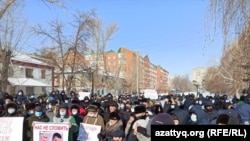In December, Kazakhstan will celebrate the 30th anniversary of its independence from the Soviet Union. On March 26, the country’s U.S. embassy Twitter account boasted about Kazakhstan’s achievements since then.
On the list:
- “GDP increased 16-fold since 1991”
- “Over $330 billion in FDI (Foreign Direct Investment) since 1991”
- “51st in UN Human Development Index, the highest among CIS nations”
And one that has raised eyebrows:
- “Multiparty democratic system and open civil society”
That claim is misleading given the Kazakhstan’s checkered history of elections.
In fact, it had the same leader for most of its existence as an independent country.
Nursultan Nazarbayev served as Kazakhstan’s president from 1991 to 2019 before stepping down at the age of 78 to take a new role as chairman of the country’s Security Council.
During Nazarbayev’s tenure, his rule was extended by various methods, including changes to Kazakhstan’s constitution that extended presidential terms and changes in election rules that did away with a 50-percent turnout requirement.
In 2005, when Nazarbayev won his third term, international election observers from the Organization for Security and Cooperation in Europe (OSCE) criticized the government’s conduct during the elections.
Foreign observers labeled Nazarbayev’s rule a dictatorship and accused his government of human rights violations. In a 2020 report, the New York-based human rights group Freedom House noted that Kazakhstan had seen improvement in the areas of democracy and civil society but still deemed the country a “consolidated authoritarian regime.”
Freedom House cited some positive developments Kazakhstan, particularly in the field of civil society, after Nazarbayev stepped down as president.
“The 2019 transfer of power was followed by a wave of political activism not seen in the country since the early 2000s,” the Freedom House report stated. “Although the overall environment of suppression of the opposition, independent media, and civil society continued during the year, the early presidential elections on June 9 were accompanied by unprecedented public debate, countrywide street protests, and a record number of citizen election observers, who actively used social media to report widespread irregularities.”
Nonetheless, OSCE election monitors criticized the presidential snap election held after Nazarbayev resigned, saying voters had “no genuine choice.”
The winner of that election, Kassym-Jomart Tokayev, was made acting president when Nazarbayev stepped aside and enjoyed a strong endorsement from his predecessor.
Tokayev has spoken of the need for political reform and responsiveness to public demands, and, to that end, he set up a National Council for Public Trust. The results of his efforts remain to be seen.
Civil rights such as freedom of assembly are curtailed in Kazakhstan. The worst incident involving the suppression of these rights occurred during Nazarbayev’s tenure, on December 16, 2011, when police opened fire on a crowd of striking oil workers in the town of Zhanaozen. Officially, the toll was put at 16 people killed and 100 injured, but locals have claimed it was higher.
Freedom House noted that authorities have adopted new methods of suppressing dissent, including hi-tech surveillance and paying agitators to assault protesters and journalists.
The claim that Kazakhstan’s political system is “multiparty” is also highly questionable. Although parties other than Nazarbayev’s ruling Nur Otan party do exist, most typically support the reigning government, while strict eligibility criteria make it difficult to register new, independent political parties.
Five pro-government parties ran In Kazakhstan’s last parliamentary election, held on January 10 this year, while the country’s only independent opposition party did not field any candidates. The OSCE’s report on the election concluded that it lacked genuine competition. The report complimented some reforms, such as easing restrictions on public protests and the requirements for registering opposition parties.
But it also stated: “Constitutionally guaranteed fundamental freedoms remain significantly restricted by law, and the space for civil society and alternative voices to flourish is constricted.”
January’s opposition-free election also saw a crackdown on protesters, with dozens arrested. The arrestees were later released without charges.
